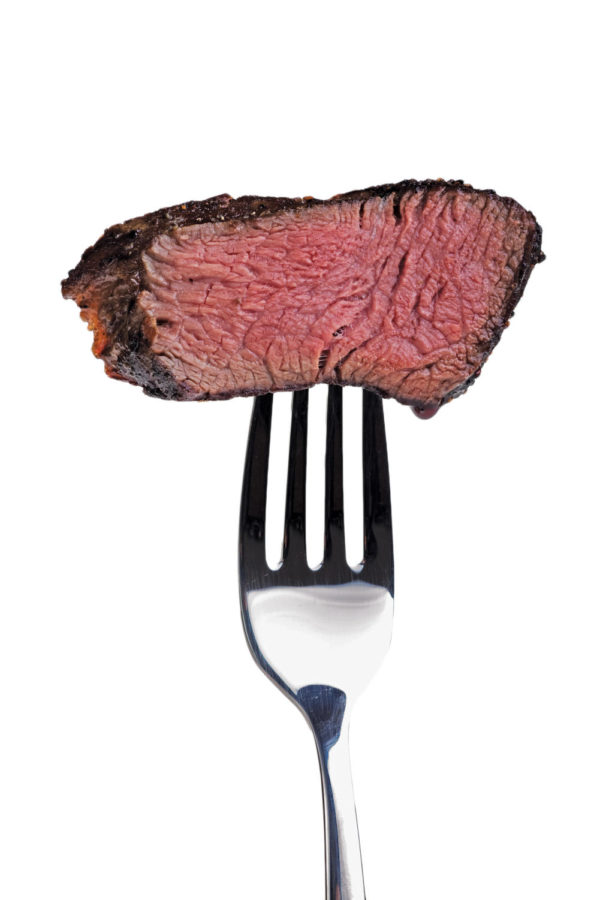Daily: To eat or not to eat — our choice to eat meat
piece of a grilled steak on a fork
April 4, 2013
As you may know, I have been wrestling over our decisions to eat — or not to eat — meat over the past couple of weeks, and I have been exploring Jonathan Safran Foer’s book “Eating Animals” in doing so. Foer’s unique combination of personal narrative and investigative journalism make a compelling read. To complete this series of discussion on the politics of the meat industry, I would like to present Foer’s final decision about meat — to eat or not to eat.
In the final chapters of “Eating Animals,” Foer finally comes to his own conclusion, which is that he personally can not eat meat and that he will raise his child as a vegetarian. Yet Foer does not stop here; unlike many authors and readers, he questions how far he can go to accept others’ decisions to eat meat. Throughout the entire novel, the reader is presented with stories and facts that explore Foer’s own journey to learn more about where his meat is coming from. He not only recounts his interactions with meat producers and growers, but also takes time to delve into moral and ethical debates that inevitably surround meat politics — especially those concerned with animal suffering and animal-human relationships.
Because Foer has so painstakingly explored all options — from factory farms to small family practices trying to raise animals with sustainable and humane practices — he is finally able to make his decision. Foer makes a powerful distinction, though he admits that his choice is personal.
He wrote, “My decision not to eat animals is necessary for me, but it is also limited — and personal. It is a commitment made within the context of my life, not anyone else’s. And until 60 or so years ago, much of my reasoning wouldn’t have even been intelligible, because the industrial animal agriculture to which I’m responding hadn’t become dominant.” Furthermore, he concludes that personal decisions to refrain from eating meat are not enough. If we merely become aloof and distance ourselves from issues by our personal decisions and absolutions, we are not solving the problem. To truly solve the problem, we have to increase our sphere of influence and actions — I will explore ways we can do this as individuals below.
In addition to all of these moral ponderings and calls to action, Foer is careful to allow other voices to speak into his work. He includes excerpts and interviews from factory farmers, small poultry farmers, ranchers, activists, PETA members and even vegetarian cattle ranchers. He recognizes that we all have different stakes in this issue and that our decision whether to eat meat or not is our own.
Foer challenges readers to make their own decision and to stand up for that decision. He makes it clear that how we participate in the food industry is a vital question today. It has become a social and political movement worth fighting for. For example, he says, “We can’t plead, only indifference. Those alive today are the generations that came to know better. We have the burden and the opportunity of living in the moment when the critique of factory farming broke into the popular consciousness. We are the ones who will be fairly asked, ‘What did you do when you learned the truth about eating animals?’”
I know that at times, everything can seem to be politicized, and I know that our decisions about food are often simply based on cost and time. It takes longer to prepare a meal than it does to heat up a pre-made meal in the microwave. I know that our expenses as students often limit our grocery budgets. But this matters. Food matters. We can change traditions and habits. We need to say no to factory farming. It is inhumane and morally unacceptable. I am not saying that we should not eat meat, but if we are going to, the way we treat animals has to change.
If you are curious to find more discussion on Foer’s book, I encourage you to check out my other columns: “Talking about meat” and “Eating meat means eating animals,” as well as reading Foer’s book. Foer raises so many important issues and questions to consider about the state of the meat industry in the states today. His novel is extremely well-researched and as objective as possible. I highly encourage you to read it — it is not your typical pro-vegetarian, anti-meat rant, which I know makes some readers skeptical or apprehensive. Whether you eat meat or not, there is a lot of valuable information Foer has to share.
Kristen Daily is a junior in English from Orange City, Iowa.

















